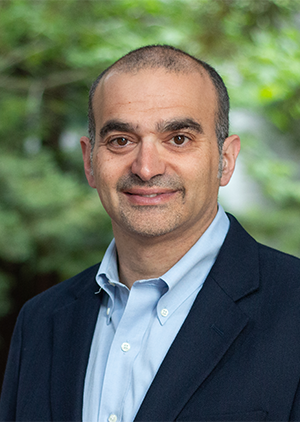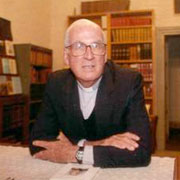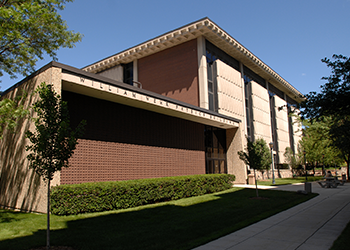Monday, April 15, 2024 | 7:00pm
Alumni Memorial Union, Ballroom B
Fast Radio Bursts: An Enduring Cosmic Mystery
Dr. Bryan Gaensler
Dean of the Division of Physical & Biological Sciences
University of California, Santa Cruz
In August of 2001, an extremely bright, brief, extraterrestrial radio signal washed over the Earth. This flash of radiation lasted just a few milliseconds, originated from around four billion light years away, and contained more energy in a fraction of a second than the Sun gives off in an entire year. More than 20 years later, astronomers have now found thousands more of these “fast radio bursts”, but incredibly, we still have no idea what they are. Professor Bryan Gaensler will explain how fast radio bursts were discovered, why they’re so enigmatic, and how they could be key to understanding some of the fundamental properties of the Universe.
 Bryan Gaensler is the Dean of the Division of Physical & Biological Sciences at the University of California, Santa Cruz. He is a leading researcher internationally on astrophysical magnetism, cosmic explosions, and interstellar gas.
Bryan Gaensler is the Dean of the Division of Physical & Biological Sciences at the University of California, Santa Cruz. He is a leading researcher internationally on astrophysical magnetism, cosmic explosions, and interstellar gas.
Gaensler became dean at UC Santa Cruz in 2023. Before that, he was at the University of Toronto, where he was director of the Dunlap Institute for Astronomy and Astrophysics, a professor of astronomy and astrophysics, and the Canada Research Chair in Radio Astronomy. He also served as the Canadian Science Director for the Square Kilometre Array, as the co-chair of the Canadian Astronomy Long Range Plan 2020-2030, and as co-chair of the Toronto Initiative for Diversity and Excellence (TIDE). He previously held positions at the University of Sydney, Harvard, the Smithsonian Institution, and MIT, after receiving his Ph.D. in physics from the University of Sydney in 1999.
Gaensler has published more than 450 research papers, and his best-selling popular astronomy book Extreme Cosmos has been translated into five languages. He is a fellow of the Australian Academy of Science, a former Alfred P. Sloan fellow and Young Australian of the Year, and gave the 2001 Australia Day address to the nation. His research has been recognized by the American Astronomical Society (Pierce Prize), the Australian Academy of Science (Pawsey Medal), and the Canadian Astronomical Society (Martin Award), and his work has twice been named as one of Science magazine’s breakthroughs of the year (2005 and 2020).
History of the Coyne Lecture Series
 The lecture series was established in 2005 through a generous donation by Mrs. Mercedes Hurley Hughes, Alumna of the College of Arts and Sciences and Marquette Trustee Emerita. Mrs. Hughes established the endowment for this lecture series and has enabled us to share the excitement of astronomy with the Marquette Community. The lecture series honors the Reverend George V. Coyne, Society of Jesus (S. J.). As director of the Vatican Observatory, Rev. George V. Coyne, S.J. led a team of Jesuit astronomers in conducting cutting-edge astronomical research and in developing new telescopes and other instrumentation for studying the cosmos.
The lecture series was established in 2005 through a generous donation by Mrs. Mercedes Hurley Hughes, Alumna of the College of Arts and Sciences and Marquette Trustee Emerita. Mrs. Hughes established the endowment for this lecture series and has enabled us to share the excitement of astronomy with the Marquette Community. The lecture series honors the Reverend George V. Coyne, Society of Jesus (S. J.). As director of the Vatican Observatory, Rev. George V. Coyne, S.J. led a team of Jesuit astronomers in conducting cutting-edge astronomical research and in developing new telescopes and other instrumentation for studying the cosmos.
The Rev. George V. Coyne, S.J. Annual Lecture in Astronomy and Astrophysics honors the tradition of excellence in research exemplified by the Rev. Coyne by bringing an outstanding astronomer or astrophysicist to the Marquette campus to give a public lecture explaining their research. The Coyne lecturer is selected annually by faculty members of the Physics Department.
Mrs. Mercedes Hurley Hughes
 We offer our thanks to Mrs. Mercedes Hurley Hughes for her friendship and generosity to the Marquette Community.
We offer our thanks to Mrs. Mercedes Hurley Hughes for her friendship and generosity to the Marquette Community.
Mrs. Hughes was a native of Cleveland, Ohio. While working for the U.S. State Department in Ankara, Turkey, she met and married her husband, Colonel John Bell Hughes (deceased) who was serving as a military attaché. Col. Hughes received a graduate degree in physics from the University of Virginia, so we proudly claim Mercedes as a physicist by marriage. John and Mercedes Hughes had four children. Mrs. Hughes called Tucson, Arizona, the "astronomy capital of the world" home for many years. She was member emeritus of the Marquette University Board of Trustees and of the Vatican Observatory Foundation. Col. and Mrs. Hughes became life-long friends of Father Coyne while he served on the Astronomy Department faculty at the University of Arizona, and through his work in local parishes and at the Univ. of Arizona's Newman Center.
Photo: Mrs. Hughes (center) and her sister Georgia Hurley Kurz greet Bishop Emeritus Norbert Dorsey of Orlando. (Picture courtesy of the Florida Catholic by Valeta Orlando)


 Bryan Gaensler is the Dean of the Division of Physical & Biological Sciences at the University of California, Santa Cruz. He is a leading researcher internationally on astrophysical magnetism, cosmic explosions, and interstellar gas.
Bryan Gaensler is the Dean of the Division of Physical & Biological Sciences at the University of California, Santa Cruz. He is a leading researcher internationally on astrophysical magnetism, cosmic explosions, and interstellar gas.  The lecture series was established in 2005 through a generous donation by Mrs. Mercedes Hurley Hughes, Alumna of the College of Arts and Sciences and Marquette Trustee Emerita. Mrs. Hughes established the endowment for this lecture series and has enabled us to share the excitement of astronomy with the Marquette Community. The lecture series honors the Reverend George V. Coyne, Society of Jesus (S. J.). As director of the Vatican Observatory, Rev. George V. Coyne, S.J. led a team of Jesuit astronomers in conducting cutting-edge astronomical research and in developing new telescopes and other instrumentation for studying the cosmos.
The lecture series was established in 2005 through a generous donation by Mrs. Mercedes Hurley Hughes, Alumna of the College of Arts and Sciences and Marquette Trustee Emerita. Mrs. Hughes established the endowment for this lecture series and has enabled us to share the excitement of astronomy with the Marquette Community. The lecture series honors the Reverend George V. Coyne, Society of Jesus (S. J.). As director of the Vatican Observatory, Rev. George V. Coyne, S.J. led a team of Jesuit astronomers in conducting cutting-edge astronomical research and in developing new telescopes and other instrumentation for studying the cosmos. We offer our thanks to Mrs. Mercedes Hurley Hughes for her friendship and generosity to the Marquette Community.
We offer our thanks to Mrs. Mercedes Hurley Hughes for her friendship and generosity to the Marquette Community.